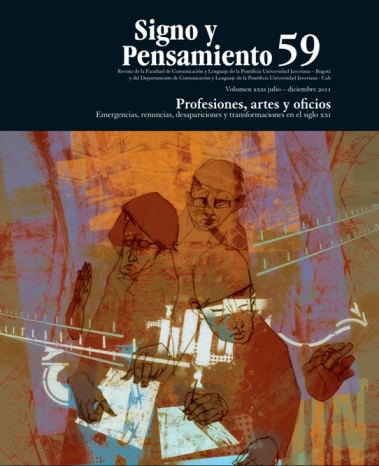Resumo
El campo de las profesiones y oficios de la comunicación es un tema estructurante, en lo referente a la reflexión del campo crítico de la disciplina y su postura ética como proceso de formación. Estudiar sus relaciones interdisciplinares y explorar posibilidades metodológicas para la adecuación de su análisis dentro de las ciencias sociales es una aventura epistemológica que abre nuevos sentidos para su posible configuración como objeto de estudio y producción de conocimiento. El enfoque permanente del texto es la mirada dialógica y relacional como estrategia de producción de sentido, imaginarios y análisis del nuevo campo. Se trata de un breve boceto que reabre un debate necesario para la academia y su función como reguladora de prácticas sociales en múltiples comunidades y escenarios de vida cotidiana.
Bolaño, C.; Mastrini, G., y Sierra, F. (2005), Economía política, comunicación y conocimiento. Una perspectiva crítica latinoamericana, Buenos Aires, La Crujía.
Bourdieu, P.; Chamboredon, J. P., y Passeron, J. P. (1987), El oficio de sociólogo. Presupuestos epistemológicos, México, Siglo XXI.
Eco, U. (1965), Apocalípticos e integrados, Barce lona, Lumen.
Fuentes Navarro, R. (2007a), “Prácticas profesio nales y utopía universitaria: notas para pensar el modelo de comunicador”, en Diálogos de la Comunicación, núm. 31, disponible en http://www.dialogosfelafacs.net/articulos-for31RaulFuentes.php, recuperado: 3 de mayo de 2011.
— (2007b), entrevistados por Revista Argentina de Comunicación, año 2, núm. 2, PrometeoLibros, pp. 217-223.
— (2008), “La investigación de la comunicación en América Latina: condiciones y perspec tivas para el siglo XXI”, en Diálogos de la Comunicación, disponible en http://www. dialogosfelafacs.net/dialogos_epoca/pdf/5605RaulFuentes.pdf, recuperado: 3 de mayo de 2011.
— (2010), “Investigación de la comunicación: referentes y condiciones internacionales de un diálogo transversal de saberes”, en Signo y Pensamiento, núm. 57, vol. XXIX, Pontificia Universidad Javeriana.
Grimson, A. (2008), “Resguardar nuestra incer teza acerca de la incertidumbre: debates acerca de interculturalidad y comunicación”, en Ciudadanías de la incertidumbre: comunicación, poder y subjetividad, Pontificia Universidad Javeriana.
Martín-Barbero, J. (1990). “Teoría – Investigación - Producción en la enseñanza de la comunicación.” En: Diálogos de la Comunicación N° 28. Lima, Perú: FELAFACS.
— (1998), De los medios a las mediaciones, 5.ª ed., Bogotá, Convenio Andrés Bello.
— (2005), “Poner este roto país a comunicar” (discurso doctor honoris causa), en Signo y Pensamiento, vol. XXIV, núm. 46, Pontificia Universidad Javeriana, pp. 163-169.
— (coord.) (2009), Entre saberes desechables y saberes indispensables (agendas de un país desde la comunicación), Bogotá, Fundación Friedrich Ebert Stiftung.
Mattelart, A. y Mattelart, M. (1987), Pensar sobre los medios: comunicación y crítica social, Madrid, Fundesco.
Orozco Gómez, G. (1994), Al rescate de los medios, México, Universidad Iberoamericana - Fun dación Manuel Buendía.
Sosa, L. (2009), “Economía política de la comu nicación: hacia un paradigma alternativo de investigación de las industrias culturales”, en Revista Electrónica de Comunicación, Cultura y Sociedad, disponible en http://imagine.com. ar/perspectivas, recuperado: 1 de mayo de 2011.
Vasallo de Lópes, M. I. (2006), “La investigación de la comunicación: cuestiones epistemológi cas, teóricas y metodológicas”, en Diálogos de la Comunicación, FELAFACS.
Esta revista científica se encuentra registrada bajo la licencia Creative Commons Reconocimiento 4.0 Internacional. Por lo tanto, esta obra se puede reproducir, distribuir y comunicar públicamente en formato digital, siempre que se reconozca el nombre de los autores y a la Pontificia Universidad Javeriana. Se permite citar, adaptar, transformar, autoarchivar, republicar y crear a partir del material, para cualquier finalidad (incluso comercial), siempre que se reconozca adecuadamente la autoría, se proporcione un enlace a la obra original y se indique si se han realizado cambios. La Pontificia Universidad Javeriana no retiene los derechos sobre las obras publicadas y los contenidos son responsabilidad exclusiva de los autores, quienes conservan sus derechos morales, intelectuales, de privacidad y publicidad.
El aval sobre la intervención de la obra (revisión, corrección de estilo, traducción, diagramación) y su posterior divulgación se otorga mediante una licencia de uso y no a través de una cesión de derechos, lo que representa que la revista y la Pontificia Universidad Javeriana se eximen de cualquier responsabilidad que se pueda derivar de una mala práctica ética por parte de los autores. En consecuencia de la protección brindada por la licencia de uso, la revista no se encuentra en la obligación de publicar retractaciones o modificar la información ya publicada, a no ser que la errata surja del proceso de gestión editorial. La publicación de contenidos en esta revista no representa regalías para los contribuyentes.


